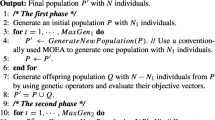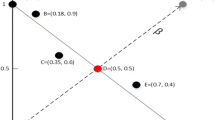Abstract
As pointed out in recent studies, most evolutionary algorithms have shown their promise in dealing with many-objective optimization problems (MaOPs). However, the ability to balance convergence and diversity and the scalability of objectives are still far from perfect. To address these issues, this paper proposes a strengthened diversity indicator and reference vector-based evolutionary algorithm for many-objective optimization, termed SDIEA. In the proposed SDIEA, a new adaptive indicator is proposed, namely, strengthened diversity indicator (SDI). The proposed SDI is adopted to effectively emphasize the pressure of convergence and diversity in the many-objective space, by preserving the achievement scalarizing function (ASF) metric and considering angle information between individuals and reference vectors with the number of objectives and generations. Moreover, in order to further enhance the diversity management in global space, the reference vectors are used to guide population partition selection. Finally, the selected solutions based on SDI and reference vector are merged for the next generation. Experimental results show that the proposed SDIEA achieves competitive performance on MaF and WFG, compared with several state-of-the-art algorithms. Additionally, SDIEA obtains good performance on 20-objective test instances and still has the potential to strive for scalability of higher objectives.





Similar content being viewed by others
References
Aguirre H, Tanaka K (2009) Space partitioning with adaptive ε-ranking and substitute distance assignments, In Proceedings of the 11th Annual conference on Genetic and evolutionary computation - GECCO ’09, p. 547.
Alhindi A, Alhejali A, Alsheddy A, Tairan N, Alhakami H (2019) MOEA/D-GLS: a multiobjective memetic algorithm using decomposition and guided local search. Soft Comput 23(19):9605–9615
Bader J, Zitzler E (2011) HypE: an algorithm for fast hypervolume-based many-objective optimization. Evol Comput 19(1):45–76
Bai H, Zheng J, Yu G, Yang S, Zou J (2019) A Pareto-based many-objective evolutionary algorithm using space partitioning selection and angle-based truncation. Inf Sci (ny) 478:186–207
Bi X, Wang C (2017) An improved NSGA-III algorithm based on objective space decomposition for many-objective optimization. Soft Comput 21(15):4269–4296
Cheng R et al (2017) A benchmark test suite for evolutionary many-objective optimization. Complex Intell Syst 3(1):67–81
Cheng R, Jin Y, Olhofer M, Sendhoff B (2016) A Reference Vector Guided Evolutionary Algorithm for Many-Objective Optimization. IEEE Trans Evol Comput 20(5):773–791
Chen H, Zhu X, Liu G, Pedrycz W (2019) Uncertainty-aware online scheduling for real-time workflows in cloud service environment. IEEE Trans Serv Comput. https://doi.org/10.1109/TSC.2018.2866421
Deb K, Agrawal RB (1994) Simulated binary crossover for continuous search space. Complex Syst 9(3):1–15
Deb K, Goyal M (1996) A combined genetic adaptive search (geneas) for engineering design. Computer Sci Informatics 26:30–45
Deb K, Jain H (2014) An evolutionary many-objective optimization algorithm using reference-point-based nondominated sorting approach part i: solving problems with box constraints. IEEE Trans Evol Comput 18(4):577–601
Deb K, Pratap A, Agarwal S, Meyarivan T (2002) A fast and elitist multiobjective genetic algorithm: NSGA-II. IEEE Trans Evol Comput 6(2):182–197
Elarbi M, Bechikh S, Gupta A, Ben Said L, Ong Y-S (2018) A new decomposition-based nsga-ii for many-objective optimization. IEEE Trans Syst Man, Cybern Syst 48(7):1191–1210
Fleischer M (2003) The measure of pareto optima applications to multi-objective metaheuristics. In: Fonseca CM, Fleming PJ, Zitzler E, Thiele L, Deb K (eds) Lecture notes in computer science including subseries lecture notes in artificial intelligence and lecture notes in bioinformatics. Springer, Berlin, pp 519–533
Gao C, Wang H, Zhai L, Gao Y, Yi S, An Energy-Aware Ant Colony Algorithm for Network-Aware Virtual Machine Placement in Cloud Computing, In 2016 IEEE 22nd International Conference on Parallel and Distributed Systems (ICPADS), 2016, pp. 669–676.
Giagkiozis I, Purshouse RC, Fleming PJ (2015) An overview of population-based algorithms for multi-objective optimisation. Int J Syst Sci 46(9):1572–1599
Goulart F, Campelo F (2016) Preference-guided evolutionary algorithms for many-objective optimization. Inf Sci (ny) 329:236–255
Hernández Gómez R, Coello Coello C. A (2015) Improved Metaheuristic Based on the R2 Indicator for Many-Objective Optimization, In Proceedings of the 2015 on Genetic and Evolutionary Computation Conference - GECCO ’15, pp. 679–686.
He Z, Yen GG (2016) Many-objective evolutionary algorithm: objective space reduction and diversity improvement. IEEE Trans Evol Comput 20(1):145–160
Huband S, Hingston P, Barone L, While L (2006) A review of multiobjective test problems and a scalable test problem toolkit. IEEE Trans Evol Comput 10(5):477–506
Hu Z, Yang J, Cui H, Wei L, Fan R (2019) MOEA3D: a MOEA based on dominance and decomposition with probability distribution model. Soft Comput 23(4):1219–1237
Hisao Ishibuchi, Noritaka Tsukamoto, and Yusuke Nojima, (2008) Evolutionary many-objective optimization: A short review, in 2008 IEEE Congress on Evolutionary Computation (IEEE World Congress on Computational Intelligence), pp 2419–2426.
Lei H, Wang R, Zhang T, Liu Y, Zha Y (2016) A multi-objective co-evolutionary algorithm for energy-efficient scheduling on a green data center. Comput Oper Res 75:103–117
Liang Z, Hu K, Ma X, Zhu Z (2021) A many-objective evolutionary algorithm based on a two-round selection strategy. IEEE Trans Cybern 51(3):1417–1429
Liu Y, Zhu N, Li K, Li M, Zheng J, Li K (2020) An angle dominance criterion for evolutionary many-objective optimization. Inf Sci (ny) 509:376–399
Li M, Yang S, Liu X (2014) Shift-based density estimation for pareto-based algorithms in many-objective optimization. IEEE Trans Evol Comput 18(3):348–365
Li M, Zhen L, Yao X (2017) How to read many-objective solution sets in parallel coordinates. IEEE Comput Intell Mag 12(4):88–100
Li F, Cheng R, Liu J, Jin Y (2018) A two-stage R2 indicator based evolutionary algorithm for many-objective optimization. Appl Soft Comput 67:245–260
Luo N, Li X, Lin Q (2018) Objective reduction for many-objective optimization problems using objective subspace extraction. Soft Comput 22(4):1159–1173
Ma X, Qi Y, Li L, Liu F, Jiao L, Wu J (2014) MOEA/D with uniform decomposition measurement for many-objective problems. Soft Comput 18(12):2541–2564
Mukhopadhyay U, Maulik SB, Coello CAC (2014) A Survey of Multiobjective Evolutionary Algorithms for Data Mining: Part I. IEEE Trans Evol Comput 18(1):4–19
Qi Y, Ma X, Liu F, Jiao L, Sun J, Wu J (2014) MOEA/D with adaptive weight adjustment. Evol Comput 22(2):231–264
Shang K, Ishibuchi H, Ni X (2020) R2-based hypervolume contribution approximation. IEEE Trans Evol Comput 24(1):185–192
Sun Y, Yen GG, Yi Z (2019) IGD indicator-based evolutionary algorithm for many-objective optimization problems. IEEE Trans Evol Comput 23(2):173–187
Tian Y, Cheng R, Zhang X, Jin Y (2017) PlatEMO: a matlab platform for evolutionary multi-objective optimization [educational forum]. IEEE Comput Intell Mag 12(4):73–87
Tian Y, Cheng R, Zhang X, Su Y, Jin Y (2019) A strengthened dominance relation considering convergence and diversity for evolutionary many-objective optimization. IEEE Trans Evol Comput 23(2):331–345
Wang R, Purshouse RC, Fleming PJ (2013) Preference-inspired coevolutionary algorithms for many-objective optimization. IEEE Trans Evol Comput 17(4):474–494
Wang H, Jiao L, Yao X (2015) Two_Arch2: an improved two-archive algorithm for many-objective optimization. IEEE Trans Evol Comput 19(4):524–541
Xu Y, Li K, Hu J, Li K (2014) A genetic algorithm for task scheduling on heterogeneous computing systems using multiple priority queues. Inf Sci (ny) 270:255–287
Yan B, Zhao Q, Wang Z, Zhao X (2017) A hybrid evolutionary algorithm for multiobjective sparse reconstruction. Signal, Image Video Process 11(6):993–1000
Yuan Y, Xu H (2015) Multiobjective flexible job shop scheduling using memetic algorithms. IEEE Trans Autom Sci Eng 12(1):336–353
Yuan Y, Xu H, Wang B, Yao X (2016) A new dominance relation-based evolutionary algorithm for many-objective optimization. IEEE Trans Evol Comput 20(1):16–37
Yuan J, Liu H-L, Gu F, Zhang Q, He Z (2021) Investigating the properties of indicators and an evolutionary many-objective algorithm using promising regions. IEEE Trans Evol Comput 25(1):75–86
Zhang X, Tian Y, Jin Y (2015) A knee point-driven evolutionary algorithm for many-objective optimization. IEEE Trans Evol Comput 19(6):761–776
Zhou J et al (2019) A decomposition based evolutionary algorithm with direction vector adaption and selection enhancement. Inf Sci (ny) 501:248–271
Zhou A, Qu B-Y, Li H, Zhao S-Z, Suganthan PN, Zhang Q (2011) Multiobjective evolutionary algorithms: a survey of the state of the art. Swarm Evol Comput 1(1):32–49
Zitzler E, Laumanns M, Thiele L (2001) SPEA2: Improving the strength Pareto evolutionary algorithm for multiobjective optimization, In Proceedings of the Fifth Conference on Evolutionary Methods for Design, Optimization and Control with Applications to Industrial Problems, pp 95–100.
Acknowledgements
This work is supported by the National Natural Science Foundation of China [Grant 61440049, Grant 61866025 and Grant 61866026], the Natural Science Foundation of Jiangxi Province [Grant 20181BAB202025], the Superiority Science and Technology Innovation Team Program of Jiangxi Province [Grant 20181BCB24008], and the Graduate Innovation Fund of Jiangxi Province [Grant YC2019-S400].
Author information
Authors and Affiliations
Corresponding author
Ethics declarations
Conflict of interest
All authors declare that they have no conflict of interest.
Ethical approval
This article does not contain any studies with human participants or animals performed by any of the authors.
Informed consent
Informed consent was obtained from all individual participants included in the study.
Additional information
Publisher's Note
Springer Nature remains neutral with regard to jurisdictional claims in published maps and institutional affiliations.
Appendix
Appendix
See Table 8.
Rights and permissions
About this article
Cite this article
Sun, W., Li, J. A strengthened diversity indicator and reference vector-based evolutionary algorithm for many-objective optimization. Soft Comput 25, 10257–10273 (2021). https://doi.org/10.1007/s00500-021-05981-1
Accepted:
Published:
Issue Date:
DOI: https://doi.org/10.1007/s00500-021-05981-1




